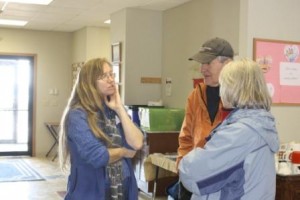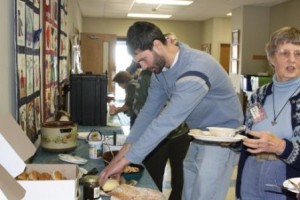Slow Food works to change the way we think
“Changing the Way We Eat” on February 12 had the Maumee Valley Chapter of Slow Food inviting people to a potluck and a meeting that broadcast throughout the nation on the importance of healthy eating practices.
Slow food is an organization that started in Italy about 25 years ago.
“It was started by a group of students that were protesting American fast food restaurants being built in Italy,” said Lucy Long, a professor at Bowling Green State University and the cofounder of the Maumee Valley chapter of Slow Food.
According to Long the Italian founders of Slow Food didn’t have a problem with hamburger joints but they did have a problem with the attitudes that the American fast food industry promoted with its customers.
“They were very concerned that American fast food represented all these attitudes that food was simply for fuel and that they didn’t really care about the quality or where it came from,” Long said.
Since its creation Slow Food has spread from Italy to the United States with the first chapter starting in New York. Originally the American version of Slow Food focused mostly on eating good food, even gourmet food. According to Long it has slowly started to focus on the other aspects of the originally organization: fairness in the industry and a clean environment where the food is grown and prepared.
Long said there are two parts to Slow Food’s view on clean food, having a clean environment and farming practices that are sustainable and having a clean atmosphere where the food is prepared.

Lucy Long, event organizer, spoke with members of the Maumee Valley Unitarian Church. Photo by Alesia Hill.
“You don’t want to be eating something and have it be prepared by someone who is sick but too poor to stay home today, and actually that’s a huge problem in the
United States. Something like 60 percent of the food workers in the fast food industry are actually sick at work,” Long said.
Because of its clean food pledge the Slow Food movement also strives environmentally sustainable.
“You don’t want to eat the very last fish in the sea because you like to eat fish so you want to use environmentally sustainable practices,” Long said.
According to Long, American culture is very focused on the science aspect of agriculture, as shown through the use of genetically altered crops to increase the amount of crops harvested every year. Corn is one of these crops and is one of the biggest products of Northwest Ohio.
It isn’t unheard of viruses hitting plants. In Ireland people’s main staple was potatoes. “In the 1800s, there were three different blights of potatoes, and millions of people starved. So in the long run, it’s not healthy for us, and its not healthy for the environment either,” Long said.

Attendees mingle at the "Changing the Way We Eat" event on Saturday, Feb. 12, at the Maumee Valley Unitarian Church in Bowling Green, Ohio. The daylong meeting and potluck was sponsored by Slow Food Maumee Valley. Photo by Alesia Hill.
is another aspect associated with Slow Food. If the food that is going into the body is healthy and clean, people will also be taking nutritional value into account.
Dietary guidelines tell Americans that fat in the diet is bad. “We’ve got too much fat and sugar in our diet. But it’s a lot more complicated than that as far as the fat is concerned because some fats are beneficial,” said Chris Patterson, a retired dietician attending the Slow Food event.
Patterson believes that the United States dietary guidelines places too much emphasis on reducing fat, without considering what kind of fat.
“Even though skim milk is what they use to fatten pigs, skim milk is what they have in schools and they think that it’s going to make kids skinny,” Patterson said. “It’s not going to happen.
Karen Lyke is a professor at Hawthorne University who teaches courses in Holistic Nutrition.
“In these courses the students study many different ways of eating and come to something that is meaningful to them,” Lyke said.
Slow Food ties together nutrition, the environment, and fair labor practices in one movement that is slowly working for change in the United States.
“This isn’t a political movement. We’re not trying to get people to vote for someone or to support some special measure. We just want to get people thinking,” Long said.
